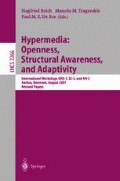Abstract
This paper presents two empirical usability studies based on techniques from Human-Computer Interaction (HCI) and software engineering, which were used to elicit requirements for the design of a hypertext generation system. Here we will discuss the findings of these studies, which were used to motivate the choice of adaptivity techniques. The results showed dependencies between different ways to adapt the explanation content and the document length and formatting. Therefore, the system’s architecture had to be modified to cope with this requirement. In addition, the system had to be made adaptable, in addition to being adaptive, in order to satisfy the elicited users’ preferences.
Access this chapter
Tax calculation will be finalised at checkout
Purchases are for personal use only
Preview
Unable to display preview. Download preview PDF.
References
Liliana Ardissono and Anna Goy. Dynamic generation of adaptive web catalogs. In Peter Brusilovsky, Oliviero Stock, and Carlo Strapparava, editors, Adaptive Hypermedia and Adaptive Web-Based Systems, number 1892 in Lecture Notes in Computer Science, pages 5–16, Berlin Heidelberg, 2000. Springer Verlag.
Kalina Bontcheva. Generating Adaptive Hypertext Explanations with a Nested Agent Model. PhD thesis, University of Sheffield, 2001.
Kalina Bontcheva and Yorick Wilks. Generation of adaptive (hyper)text explanations with an agent model. In Proceedings ofthe European Workshop on Natural Language Generation (EWNLG’99), pages 67–76, Toulouse, France, May 1999.
Kalina Bontcheva and Yorick Wilks. Dealing with dependencies between content planning and surface realisation in a pipeline generation architecture. In Proceedings ofthe International Joint Conference in Artificial Intelligence (IJCAI’2001), Seattle, USA, August 2001. To appear.
Craig Boyle and Antonio O. Encarnaçion. Metadoc: An adaptive hypertext reading system. User Modelling and User-Adapted Interaction, 4(1):1–19, 1994.
Britannica Inc. Encyclopaedia Britannica CD’99. 1999. MultimediaEdition.
Peter Brusilovsky. Methods and techniques of adaptive hypermedia. User Modelling and User-Adapted Interaction, 6(2–3):87–129, 1996. Special issue on Adaptive Hypertext and Hypermedia.
Peter Brusilovsky. Adaptive hypermedia. User Modelling and User-Adapted Interaction, 11(1–2):87–110, 2001.
Richard Cox, Mick O’Donnell, and Jon Oberlander. Dynamic versus static hypermedia in museum education: an evaluation of ILEX, the intelligent labelling explorer. In S.P. Lajoie and M. Vivet, editors, Artificial Intelligence in Education: Open Learning Environment: New Computational Technologies to Support Learning, Exploration and Collaboration, pages 181–188. IOS Press, Amsterdam, 1999.
Alistair Knott, Chris Mellish, Jon Oberlander, and Mick O’Donnell. Sources of flexibility in dynamic hypertext generation. In Proceedings ofthe 8th International Workshop on Natural Language Generation (INLG’96), pages 151–160, 1996.
Alfred Kobsa, Andreas Nill, and J. Fink. Hypertext and hypermedia clients of the user modelling system BGP-MS. In Mark Maybury, editor, Intelligent Multimedia Information Retrieval. MIT Press, 1997.
Maria Milosavljevic, Adrian Tulloch, and Robert Dale. Text generation in a dynamic hypertext environment. In Proceedings ofthe 19th Australian Computer Science Conference, Melbourne, 1996.
Jakob Nielsen. Usability Engineering. Morgan Kaufman, CA, 1993.
Jakob Nielsen. Designing Web Usability: The Practice of Simplicity. New Riders Publishing, 2000.
Jenny Preece, Yvonne Rogers, Helen Sharp, David Benyon, Simon Holland, and Tom Carey. Human-Computer Interaction. Addison-Wesley, Reading, MA, 1994.
David Reinking and Robert Schreiner. The effects of computer-mediated text on measures of reading comprehension and reading behaviour. Reading Research Quarterly, Fall:536–551, 1985.
Ehud Reiter and Robert Dale. Building Natural Language Generation Systems. Cambridge University Press, Cambridge, England, 2000.
Author information
Authors and Affiliations
Editor information
Editors and Affiliations
Rights and permissions
Copyright information
© 2002 Springer-Verlag Berlin Heidelberg
About this paper
Cite this paper
Bontcheva, K. (2002). The Impact of Empirical Studies on the Design of an Adaptive Hypertext Generation System. In: Reich, S., Tzagarakis, M.M., De Bra, P.M.E. (eds) Hypermedia: Openness, Structural Awareness, and Adaptivity. AH 2001. Lecture Notes in Computer Science, vol 2266. Springer, Berlin, Heidelberg. https://doi.org/10.1007/3-540-45844-1_20
Download citation
DOI: https://doi.org/10.1007/3-540-45844-1_20
Published:
Publisher Name: Springer, Berlin, Heidelberg
Print ISBN: 978-3-540-43293-7
Online ISBN: 978-3-540-45844-9
eBook Packages: Springer Book Archive

